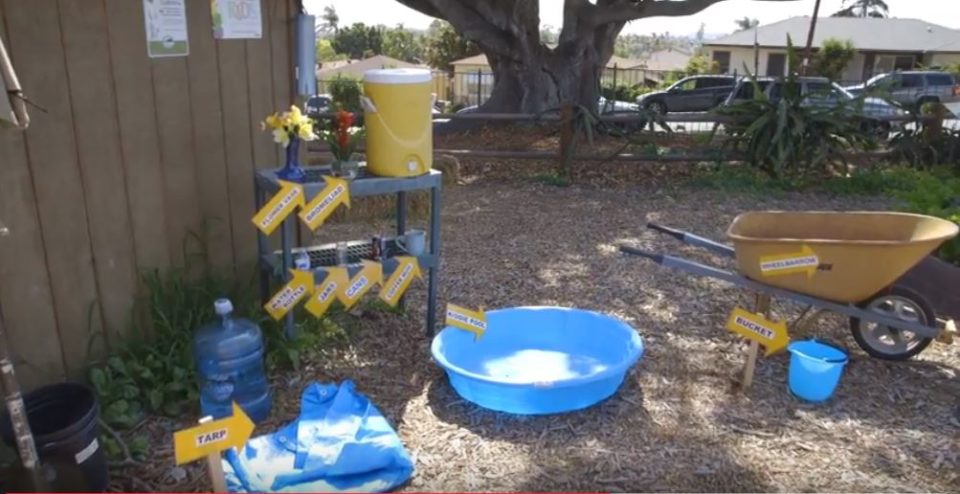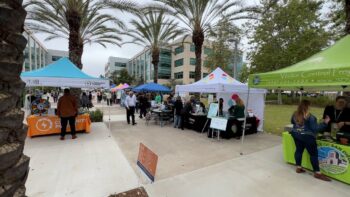San Diego County residents now have one more reason to find and dump out standing water in and around their homes to fight mosquitoes.
County environmental health officials said they’ve found a new type of invasive, aggressive, day-biting mosquito in La Mesa — the Australian backyard mosquito, Aedes notoscriptus, also known as the “Aussie Mozzie.”
County officials said they believe the mosquito is more nuisance than human health risk. However, they said it is aggressive and prefers to live and breed near people; in yards and even inside homes.
“One of the best things you can do to protect yourself from mosquitoes is to get rid of all standing water so they can’t lay eggs and breed near you,” said Chris Conlan, a supervising vector ecologist with the County’s Vector Control Program. “That means dumping water out of the saucers under flowerpots and toys laying in the yard. These mosquitoes are called the ‘backyard mosquito’ for a reason.”
County Vector Control found three adult female Australian backyard mosquitoes last week in a trap they placed in La Mesa in response to a complaint about mosquito bites. The mosquito had previously been found in Los Angeles about three years ago.
Aedes notoscriptus is the third type of invasive Aedes mosquito that has been found in San Diego County in the last four years. Aedes aegypti, the yellow fever mosquito that originated in Africa, was found here in 2014. Aedes albopictus, the Asian tiger mosquito native to tropical forests of southeast Asia, was found here in 2015.
Aedes notoscriptus looks similar to the other two invasive Aedes mosquitoes; small to mid-sized, with pale markings and banded legs, and in some cases, a hairy back.
All three of the invasive Aedes mosquitoes like to live near people and, unlike San Diego County’s native mosquitoes, like to bite during daylight hours. All three can potentially transmit different diseases to people — but only if they first bite another person or animal carrying a disease they can spread.
In laboratory studies, Aedes notoscriptus has been shown to be capable of transmitting Murray Valley encephalitis, Ross River virus and Barmah Forest virus if they first bite an infected host, but those diseases have been limited to Australia and surrounding areas.
However, like the Aedes aegypti, the Aussie Mozzie is also known to transmit dog heartworm to dogs and cats if it bites an infected animal and then bites pets.
Both the American Veterinary Medical Association and American Heartworm Society recommend pet owners have veterinarians test and prescribe heartworm preventives to protect pets. Heartworm preventives are available only by prescription from veterinarians.
County of San Diego officials, meanwhile, said county residents could protect themselves and their pets from invasive Aedes mosquitoes by remembering to follow the County’s “Prevent, Protect, Report” guidelines.
Prevent mosquito breeding
Dump out or remove any item inside or outside of homes that can hold water, such as plant saucers, rain gutters, buckets, garbage cans, toys, old tires, and wheelbarrows. Mosquito fish, available for free by contacting the Vector Control Program, may be used to control mosquito breeding in backyard water sources such as unused swimming pools, ponds, fountains and horse troughs.
Protect yourself from mosquito bites
Protect yourself from mosquito-borne illnesses by wearing long sleeves and pants or use repellent when outdoors. Use insect repellent that contains DEET, picaridin, oil of lemon eucalyptus, or IR3535. Make sure screens on windows and doors are in good condition and secured to keep insects out.
Report possible mosquito activity
Report increased mosquito activity, or neglected, green swimming pools and other mosquito-breeding sources, as well as dead birds — dead crows, ravens, jays, hawks and owls — to environmental health’s Vector Control Program by calling (858) 694-2888 or emailing vector@sdcounty.ca.gov. Also report if you are being bitten by mosquitoes during daylight hours, or if you find mosquitoes that match the description of Aedes mosquitoes by contacting the Vector Control Program at (858) 694-2888.
For more information about mosquito-borne illnesses, go to San Diego County’s “Fight the Bite” website.
Here are some tips for how you can mosquito-proof your backyard.






